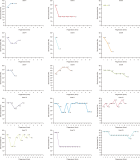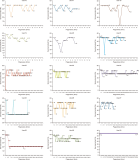- Apply for Authority
- P-ISSN2287-9099
- E-ISSN2287-4577
- SCOPUS, KCI

Vol.10 No.1
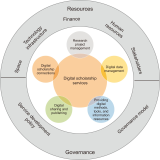
Abstract
The article reports the results of an investigation on the practice of providing digital scholarship services at Vietnam National University Ho Chi Minh City, Vietnam. This study is part of an ongoing research project entitled Developing a digital scholarship service framework for universities at Vietnam National University Ho Chi Minh City. It employed a qualitative research approach through in-depth interviews with 31 individuals who are university managers, library managers, lecturers, and postgraduate and undergraduate students from six member universities and Central Library of Vietnam National University Ho Chi Minh City. Research results show that some digital scholarship services have been provided at Vietnam National University Ho Chi Minh City. However, they have not been yet systematically implemented and have not met users’ needs. Lack of needed resources such as space, technology infrastructure, human resources, finance, and stakeholder support are among major challenges in developing digital scholarship services. The management of existing digital scholarship services is fragmented without a clear policy for developing digital scholarship and supporting services. The study contributes to the existing knowledge by adding substantially to current understanding of the practice of providing digital scholarship services in Vietnam’s universities in the transition period, from state control to autonomy, which has not been much addressed in previous research. Furthermore, this study can be a useful reference for higher education institutions in developing countries regarding implementation of digital scholarship services.


Abstract
This study aimed at overviewing the situation of information literacy education and research in the Association of Southeast Asian Nations (ASEAN) region, and developing an ASEAN network model on information literacy. This research used documentary and qualitative research methods. Key resources consisted of twenty bibliometric studies and related documents and two groups of key persons. The first group consisted of twenty-seven purposive key persons from eight countries, and the second group consisted of seven key persons from five countries. The research instruments comprised a data collection form and focus group/ interviewing forms. Data was collected by focus group discussion and online interviews, and qualitative content analysis was used in data analysis and presented descriptively. Research findings showed that: 1) information literacy education and research in the ASEAN region varied across countries and placed importance on the educational context. Singapore was found to be the most leading and productive country in ASEAN in information literacy with the highest number of journal articles on the international scale, and was among the most contributing groups at the regional and global level; 2) the ASEAN Network on Information Literacy (ASEAN-NIL) has been developed as a model with its principles, objectives, management system, activities, and promotion strategies. Its strengths are an integrated scope, multidimensional orientation, and interdisciplinary and collaborative partnerships at the national, regional, and international level, suitable for the ASEAN context, the online environment, and the digital educational ecosystem.
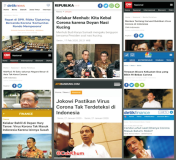
Abstract
This research aims to identify and reveal the meaning of memes about COVID-19, and explain changes in meme content in regard to the information development of COVID-19 in Indonesia published by the mass media and online media. The data is sourced from memes that are shared on social media, especially WhatsApp groups in the period of January to June 2020. To reveal the meaning of memes, a semiotic analysis of Roland Barthes’ model is used. Qualitative analysis is used to reveal the relationship between memes and the information development of COVID-19 in Indonesia. The results of the study show that meme content has shifted according to three stages of information development of COVID-19 in Indonesia published by the mass media and online media. When COVID-19 was not yet confirmed in Indonesia, meme content contained mostly humor that was not educative, moreover it seemed to underestimate the coronavirus. Meme content which is mostly humorous and pornographic occurred when COVID-19 was confirmed in Indonesia and during the lockdown policy. At last, as the government has begun to distribute social assistance, the meme content looks more critical. The results of this research emphasize the urgency of the mass media as a source of public information during the COVID-19 pandemic, become a reference for the community in making memes as a forum for expressing feelings and social criticism, and serve as a reference for the government to act and make the right decisions related to the pandemic that is endemic in their country.









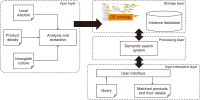
Abstract
Community enterprise plays an important role for developing local business. Products from local communities apply local specialties such as high-quality materials and inherited wisdom. This work aims to support merchandises from local community enterprises by bringing out their specialties related to local wisdom and intangible cultural aspects. An ontology is applied to demonstrate the innate information regarding the implicit values of the products and is used as a core for a semantic search system. Details of the products are gathered from their respective community using an interview method and are extracted to align with the developed ontological schema. The semantic search system thus is implemented with a recommendation process for online accessibility for providing the organised information. From evaluation, the developed ontology and its instances are rated highly for their consistency, conciseness, and completeness. In usage, accuracy of the query and recommendation results are evaluated at 97.38% searching accuracy and 85.03% for recommending interesting products.




Abstract
This text discusses elements and characteristics of contemporary informational reality, that is, the ways of producing, circulating, organizing, using, and appropriating information in the current context. Initially, seven terms and concepts used to describe this reality are discussed: fake news, false testimonials, hate speech, scientific negationism, disinformation, post-truth, and infodemic. Next, an attempt is made to present a framework for such phenomena as an object of study in information science. Therefore, this scenario is characterized based on the three main models of information science study: physical, cognitive, and social. The contribution of each of them to the study of contemporary informational reality is analyzed, identifying aspects such as the bubble effect, clickbaits, confirmation bias, cults of amateurism, and post-truth culture. Finally, it presents the discussion of a possible veritistic turn in the field, in order to think about elements not covered so far by information science in its task and challenge of producing adequate understanding and diagnoses of current phenomena. In conclusion, it is argued that only accurate and comprehensive diagnoses of such phenomena will allow information science to develop services and systems capable of combating their harmful effects.
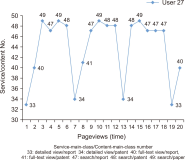
Abstract
This exploratory study aims to understand the potential of log data analysis and expand its utilization in user research methods. Transaction log data are records of electronic interactions that have occurred between users and web services, reflecting information-seeking behavior in the context of digital libraries where users interact with the service system during the search for information. Two ways were used to analyze South Korea’s National Digital Science Library (NDSL) log data for three days, including 150,000 data: a log pattern analysis, and log context analysis using statistics. First, a pattern-based analysis examined the general paths of usage by logged and unlogged users. The correlation between paths was analyzed through a χ2 analysis. The subsequent log context analysis assessed 30 identified users’ data using basic statistics and visualized the individual user information-seeking behavior while accessing NDSL. The visualization shows included 30 diverse paths for 30 cases. Log analysis provided insight into general and individual user information-seeking behavior. The results of log analysis can enhance the understanding of user actions. Therefore, it can be utilized as the basic data to improve the design of services and systems in the digital library to meet users’ needs.

